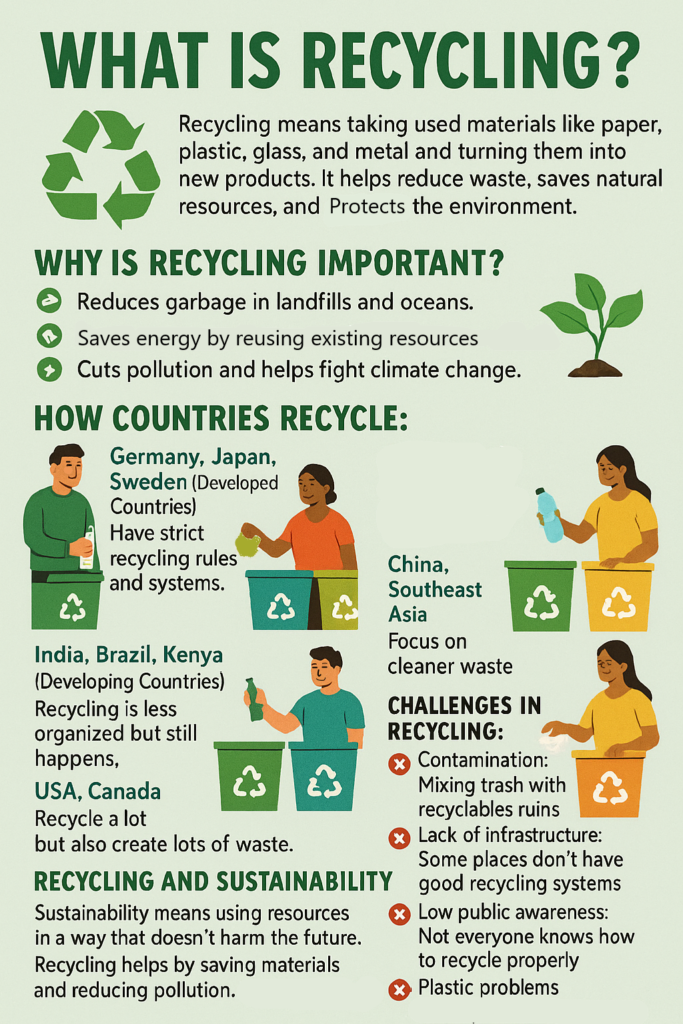Global Recycling Practices and Sustainability – Explained
Recycling is the process of collecting used materials like paper, plastic, glass, and metal and turning them into new products. It helps reduce waste, saves natural resources, and protects the environment. Around the world, countries recycle in different ways depending on their technology, laws, and how much people know about recycling.

Why Recycling Matters
When we throw things away, they often end up in landfills or the ocean, where they can take hundreds of years to break down. Recycling helps reduce this waste and prevents pollution. It also saves resources. For example, recycling paper means fewer trees need to be cut down, and recycling plastic or metal uses less energy than making new materials from scratch.
Different Recycling Practices Around the World
- Developed Countries (like Germany, Japan, Sweden):
These countries have very organized recycling systems. People sort their waste into different bins at home—like paper, plastic, and food waste. In Germany, there’s even a special system called the “Green Dot” which encourages companies to use recyclable packaging. Japan is known for its very detailed recycling rules, where citizens carefully separate different types of waste. - Developing Countries (like India, Brazil, Kenya):
In many developing countries, recycling is less organized. However, people still recycle in creative ways. In places like India or Brazil, waste pickers collect recyclable items from streets or landfills and sell them to recycling companies. These efforts help reduce waste, even though they may not be officially managed by the government. - United States and Canada:
These countries recycle a lot but also produce a lot of waste. In some areas, recycling is well-managed, but in others, people don’t recycle as much due to lack of awareness or poor recycling systems. Some materials, especially plastics, are often sent to other countries to be processed. - China and Southeast Asia:
China used to accept a large portion of the world’s recycling waste, but in recent years, it has stopped accepting low-quality or contaminated materials. This has forced many countries to rethink how they recycle and has encouraged them to process their own waste locally.
Challenges in Global Recycling
- Contamination: When people don’t sort their trash properly, it can ruin the whole batch of recyclables.
- Lack of Infrastructure: Some countries don’t have the machines or systems to recycle properly.
- Public Awareness: Many people still don’t know how or why to recycle.
- Plastic Waste: Not all plastics are recyclable. Some break down into microplastics, which harm the environment and wildlife.
Recycling and Sustainability
Sustainability means meeting our needs today without harming the ability of future generations to meet theirs. Recycling supports sustainability by reducing the need for new raw materials and lowering pollution. However, recycling alone isn’t enough. We also need to reduce how much we use and reuse items whenever possible. The three R’s—Reduce, Reuse, Recycle—all work together to protect our planet.
Summary:
Global recycling practices vary widely from country to country based on resources, laws, and public awareness. Developed nations often have advanced systems for sorting and processing recyclables, while developing countries rely more on informal recycling efforts. Recycling plays a key role in sustainability by reducing waste, saving resources, and cutting pollution. However, challenges like contamination, lack of recycling infrastructure, and plastic pollution remain. To truly protect the environment, we must not only recycle but also reduce and reuse as part of a sustainable lifestyle.
Tags: Brazil, Canada, China, Circular Economy, contamination, developed countries, Developing Countries, energy saving, environment, Environmental Protection, Germany, glass, global practices, government policy., Green Dot, India, Infrastructure, Japan, Kenya, landfills, metal, Microplastics, natural resources, ocean waste, paper, plastic, plastic pollution, pollution, public awareness, Raw Materials, Recycling, recycling challenges, recycling laws, recycling systems, recycling technology, reduce, Resource Conservation, reuse, Southeast Asia, Sustainability, sustainable lifestyle, Sweden, three R's, United States, waste pickers, waste reduction, waste sorting


